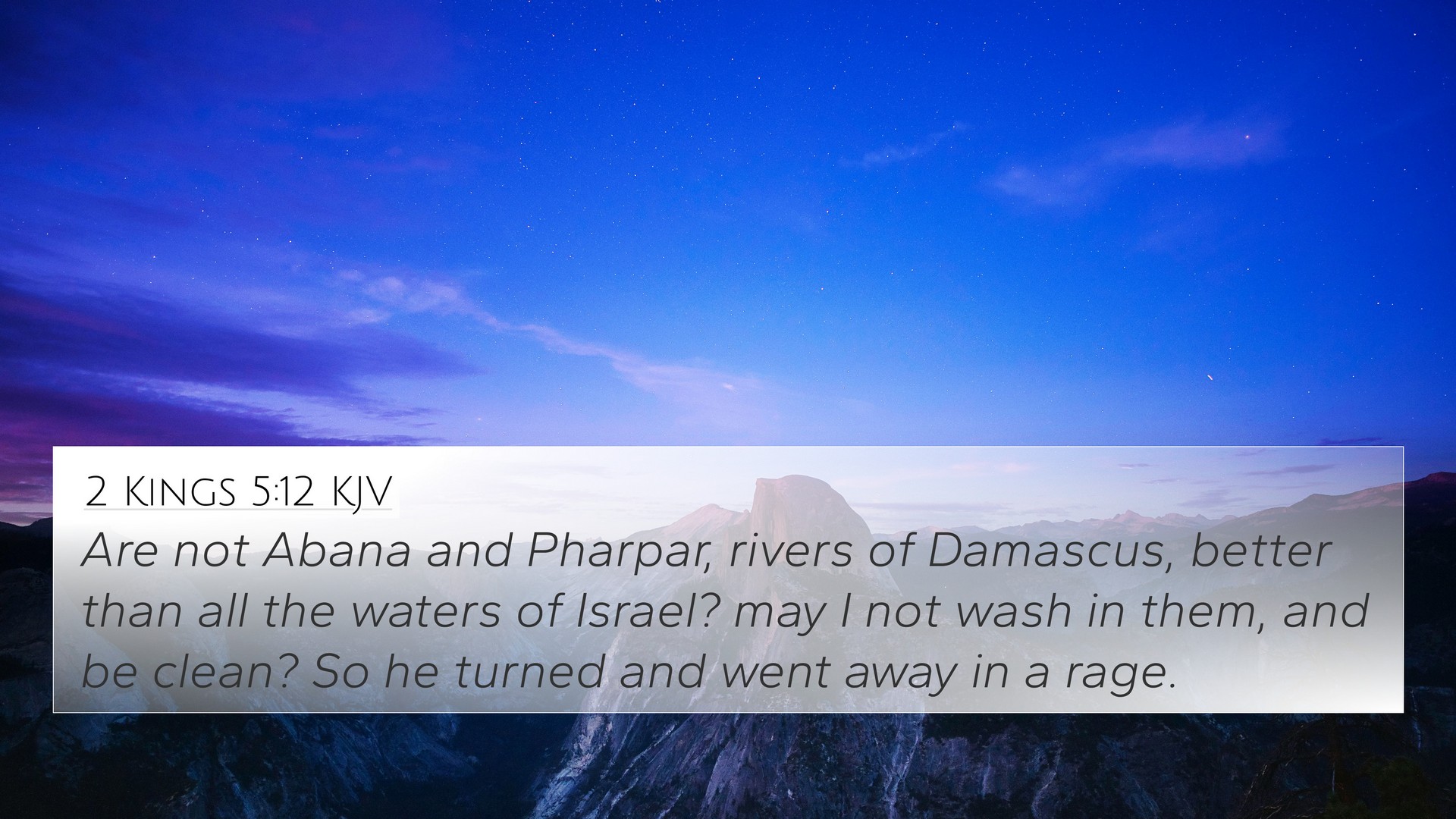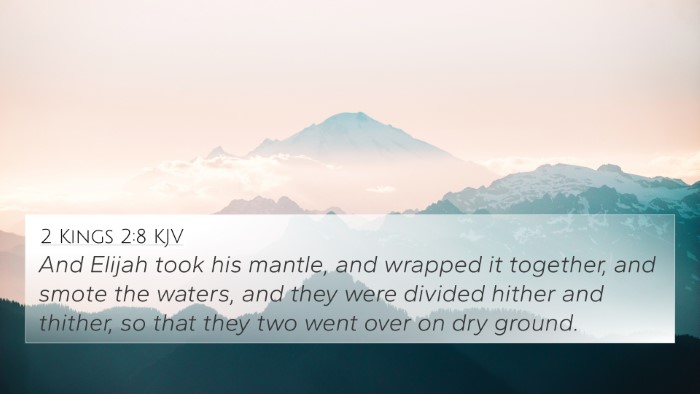Understanding 2 Kings 5:12
Bible Verse: 2 Kings 5:12
This verse states:
"Are not Abana and Pharpar, rivers of Damascus, better than all the waters of Israel? May I not wash in them, and be clean?" So he turned and went away in a rage.
Summary of Meaning
The account of Naaman's healing demonstrates the critical themes of humility, obedience, and the recognition of God's authority. The query posed by Naaman highlights a common human tendency to undervalue God's methods due to preconceived notions about how miracles should occur.
Insights from Public Domain Commentaries
Matthew Henry's Commentary
Matthew Henry points out that Naaman, a Syrian commander, initially dismisses Elisha's simple instruction to wash in the Jordan River, favoring the rivers of his homeland. This response reflects a prideful attitude, revealing his misunderstanding of God’s ways. Henry emphasizes that God often works through means that the world deems foolish, underscoring the necessity of humble obedience.
Albert Barnes' Notes on the Bible
Albert Barnes highlights Naaman's reliance on prominent rivers, symbolizing a reliance on human understanding rather than faith in God's word. He notes that this moment of resistance emphasizes the importance of spiritual cleansing that aligns with God’s instructions. Barnes further explains that the waters of Israel symbolize God’s grace, and Naaman’s arrogance blinded him to this profound truth.
Adam Clarke's Commentary
According to Adam Clarke, Naaman's reaction is rooted in his expectation of grand displays of power and not in humble submission. Clarke adds that this serves as an allegory for spiritual pride, where individuals often overlook the simplicity of God’s requirements. His commentary underlines the notion that obedience to God often requires setting aside our preconceived expectations.
Bible Cross References
- 2 Kings 5:10: Elisha instructs Naaman to wash in the Jordan.
- James 4:6: God resists the proud but gives grace to the humble.
- Isaiah 55:8-9: God's thoughts are higher than our thoughts.
- 1 Corinthians 1:27: God chooses the foolish things of the world to shame the wise.
- Luke 5:12-13: Jesus heals a man with leprosy, illustrating the need for faith.
- Acts 10:34-35: God shows no partiality but accepts those who fear Him.
- Romans 12:3: Not to think of oneself more highly than one ought to think.
Thematic Connections
The passage of 2 Kings 5:12 can be thematically connected to various biblical teachings illustrated throughout scripture:
- Humility in Faith: Naaman's experience is a reminder that true faith often requires humility and obedience.
- Divine Instruction: God often provides seemingly simple instructions that carry profound implications for our lives.
- Expectations of God’s Work: The discrepancy between Naaman’s expectations and God's methods highlights the need for trust in divine wisdom.
- Spiritual Cleansing: The act of washing in the Jordan is analogous to the spiritual cleansing required to receive God's blessings.
Inter-Biblical Dialogue
The account of Naaman’s healing invites comparative analysis and connections between different biblical verses that address themes of faith, obedience, and divine healing. For instance:
- Mark 16:17-18: Discusses the signs that will accompany those who believe, emphasizing divine intervention.
- Matthew 8:7-10: Jesus commends the faith of a centurion, contrasting Naaman's initial unbelief.
- Philippians 2:8: Christ humbled Himself, echoing the necessity of humility in receiving God’s grace.
Conclusion
The narrative found in 2 Kings 5:12 serves as a potent reminder of the transformative power of humility and obedience. By disregarding his pride and the allure of the rivers in Damascus, Naaman ultimately learned to trust in God. The interconnectedness of biblical teachings through cross-references enriches our understanding, supporting the idea that God’s methods often defy human logic yet are rooted in divine wisdom.
Tools for Bible Cross-Referencing
To explore the depths of scriptural connections, various tools and methods can enhance one's study:
- Bible Concordance: Useful for finding specific verses and exploring related concepts.
- Cross-Reference Bible Study: A structured approach to examine interconnected texts.
- Bible Cross-Reference Guide: Offers structured references for thematic studies.
- Bible Chain References: Connects verses around specific themes, facilitating comprehensive study.
Final Thoughts
As believers explore the richness of God's Word, they are encouraged to embrace the humility required to recognize and accept the profound truths found within the Scriptures, much like Naaman's eventual acceptance of God's healing in the Jordan River.












